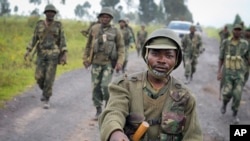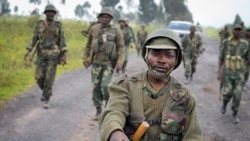In the past week, the armed forces of the Democratic Republic of the Congo, with the support of the UN’s MONUSCO peacekeeping mission, engaged members of the M23 rebel group and reclaimed control of towns and roads in the eastern DRC in rebel hands for the last year. The government is now working to re-establish state authority and provide security and other public services there to alleviate further suffering by the local population and guard against infiltration by other armed groups.
The United States welcomes President Kabila’s call for all armed groups to lay down their weapons and his stated commitment to remove all insurgents from the region, including the FDLR and ADF, with the support of MONUSCO. Continued negotiations between the government and the M23 in Kampala, Uganda, are still necessary, however, to address many residual issues. These include the M23’s disarmament and demobilization, accountability for human rights abusers and the M23’s relinquishing of whatever remaining territory it still holds. Bringing final resolution to this dialogue is the best way to resolve these issues and to avert further conflict both in the DRC and the region.
Separate from these Kampala talks, we continue to believe the Peace, Security and Cooperation Framework Agreement, signed in February 2013 by the DRC, Rwanda, Uganda and eight other African countries, presents the region with the best opportunity in decades to resolve the root causes of conflict in the region and to help realize the DRC’s and the region’s full development potential.
The United States commends the Framework signatories for the progress they have already made in the implementation of the agreement. We also believe that an African-led regional dialogue among the Framework signatories could address the root causes of instability in the region. Such a regional dialogue could be aimed at resolving the issues of neutralizing armed groups, securing borders, and creating the conditions necessary for refugees to voluntarily return home.
Our nation stands ready to support the region’s efforts to implement the Framework and to initiate an African-led regional dialogue in the pursuit of lasting peace and stability in the region.
The United States welcomes President Kabila’s call for all armed groups to lay down their weapons and his stated commitment to remove all insurgents from the region, including the FDLR and ADF, with the support of MONUSCO. Continued negotiations between the government and the M23 in Kampala, Uganda, are still necessary, however, to address many residual issues. These include the M23’s disarmament and demobilization, accountability for human rights abusers and the M23’s relinquishing of whatever remaining territory it still holds. Bringing final resolution to this dialogue is the best way to resolve these issues and to avert further conflict both in the DRC and the region.
Separate from these Kampala talks, we continue to believe the Peace, Security and Cooperation Framework Agreement, signed in February 2013 by the DRC, Rwanda, Uganda and eight other African countries, presents the region with the best opportunity in decades to resolve the root causes of conflict in the region and to help realize the DRC’s and the region’s full development potential.
The United States commends the Framework signatories for the progress they have already made in the implementation of the agreement. We also believe that an African-led regional dialogue among the Framework signatories could address the root causes of instability in the region. Such a regional dialogue could be aimed at resolving the issues of neutralizing armed groups, securing borders, and creating the conditions necessary for refugees to voluntarily return home.
Our nation stands ready to support the region’s efforts to implement the Framework and to initiate an African-led regional dialogue in the pursuit of lasting peace and stability in the region.






